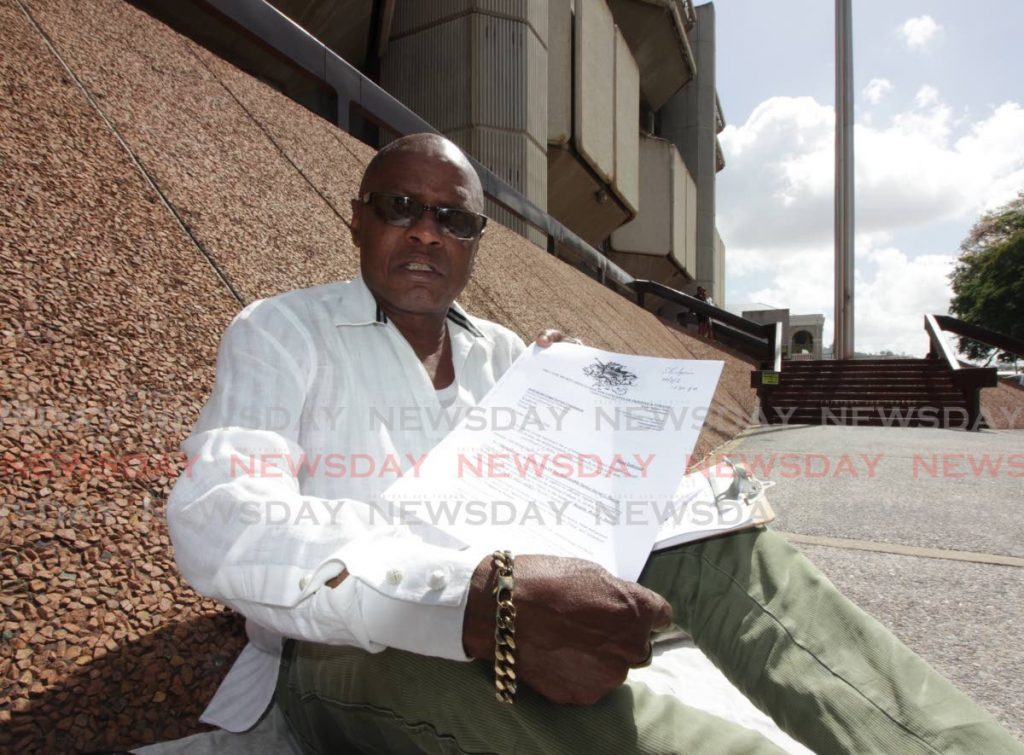Ex-hostage on Abu Bakr apology: You still owe us answers

JAMAAT al Muslimeen leader Yasin Abu Bakr's apology for the 1990 attempted coup is warranted and welcome. But it is also vague and raises a flood of questions, says survivor Wendell Eversley.
Eversley was a civilian who was held hostage in the Red House when it was stormed on July 27, 1990, and has staged small demonstrations annually to keep the traumatic event fresh in the minds of politicians.
He maintains there are many questions left unanswered, not just by the Jamaat but also by several prominent politicians and lawyers.
Eversley spoke with Newsday on Friday in response to Abu Bakr's apology, which was issued in an affidavit he filed to challenge a criminal complaint against him by a private citizen.
"I said publicly that I forgive Abu Bakr for holding me hostage against my will in the Parliament chamber," Eversley declared.
"And it took me between 15 and 18 (years) to forgive him. And when I forgive him, I said that from the bottom of my heart and by praying.
"Being used as a human shield, first in line to be shot, opening windows for the Muslimeen to jump inside the Parliament – I had hate in my heart for him and the Muslimeen for what they did to me, for the torture I went through," he said, citing the death of Lorraine Caballero, which he witnessed. Caballero, a parliamentary clerk, bled to death on the floor next to him after being shot in the abdomen.
"It left me with a scar for the rest of my life...One day, something spoke to me and told me I have to forgive in order to see God's face. So I forgive him honestly.
"If after 30 years he (apologises) for what he put people through in Parliament, TTT and Radio Trinidad, if he apologises sincerely, then I accept his apology."
In his affidavit, Bakr cited three reasons for staging the attempted coup: extra-legal and/or summary executions by the police, a corrupt government, and ripe conditions for social unrest.
Asked if he saw these factors as prevailing issues at the time, Eversley scoffed.
"Who was the corrupt government then? If he talking about the PNM who was there for 30 years? He can't be talking about ANR Robinson (prime minister of the NAR government from 1986-90)."
Bakr "talks about a policewoman who got killed and they have a right to protect women. How come nobody protect Lorraine Caballero?
"Then he talks about drugs. Who was the people involved in drugs? Is it the people in the past government? Is it businessmen?
"He has to tell us who are the people.
"The only person who could tell us the truth is him."
He suggested, however, there are likely many others who can fill in some blanks, including at least a couple of politicians at the time, who were not in Parliament on the day and some believe had prior knowledge of the impending attempted coup.
"If you file an affidavit, you swear to tell the truth. So is he going to call who was responsible in immigration and customs, who allowed them to bring in all those guns? Are we going to hear these people's names called? Who are businessmen that assist him, the politicians?"
Bakr's apology in the affidavit came about two years after he said he would never apologise for setting an example of "resistance and revolt against oppression."
He made those comments in a 2018 statement, in which he described Eversley's protests as an "unfortunate inability...to understand the context of the revolution in 1990."
He also vowed never to apologise for "arresting the criminals in Parliament and standing up for WPC Bernadette James who was murdered."
James was shot in the chest and killed during an anti-terrorist exercise at Tucker Valley, Chaguaramas, in 1987.
She was sitting in the middle of a police bus, filled with other officers. During the dramatisation, the bus was attacked by the mock terrorists. A live round was fired by a police, killing her, leading to speculation that she was purposely killed.
That live round reportedly went through the front glass of the bus, bypassed everyone sitting in the front of the vehicle, and struck James in her chest.
That live round, among a thousand blanks released for the exercise, pierced James’ chest and she died sometime later while undergoing treatment at the Seventh Day Adventist Hospital, Cocorite.
Amidst the apologies, Bakr is seeking a declaration that the continuation of his prosecution is irrational and amounts to an abuse of process.
The former People's Partnership set up a commission of enquiry in the event in 2010 and a report was finalised in 2014.
Bakr never appeared before the commission.
In his affidavit, he said this was because it had the potential to prejudice his then ongoing trial for sedition. He also wrote, "Also, please note that I am very much concerned that there may be killer gangs in existence in the TT Police Service masquerading as TTPS officers. That also may have a reason for my non-attendance at the commission. A witness in fear of the TTPS."
On July 27, 1990, a group of Jamaat al Muslimeen member, led by Bilaal Abdullah, invaded the Red House while Parliament was in session.
Elsewhere, another group led by Bakr invaded TTT, then the country's only television station, held staff hostage and took control of the broadcasts until they were blocked. A third group, led by Jamaal Shabazz, stormed Radio Trinidad.
Eversley was freed the next day.
The attempted coup ended on August 1, 1990 when Abu Bakr, along with his 113 insurgents, surrendered and released the remaining hostages.

Comments
"Ex-hostage on Abu Bakr apology: You still owe us answers"